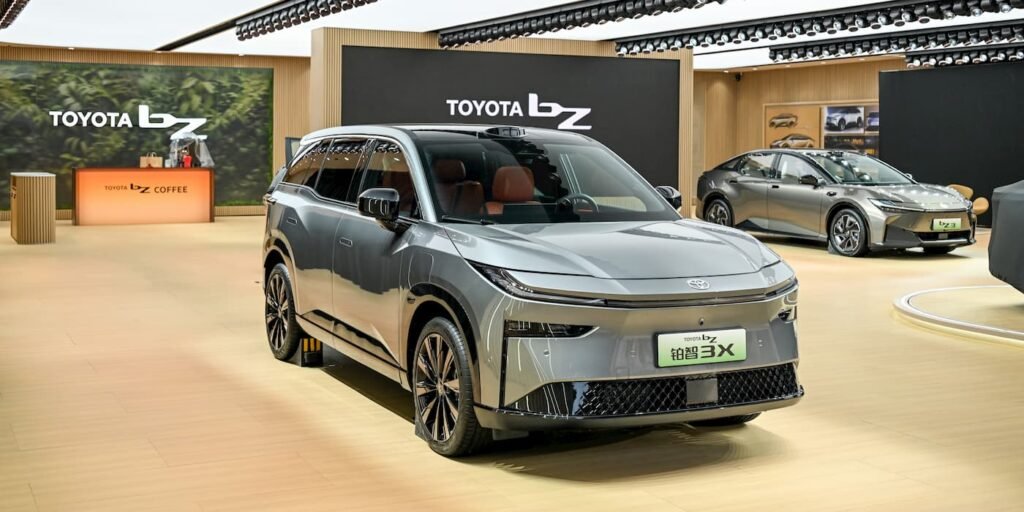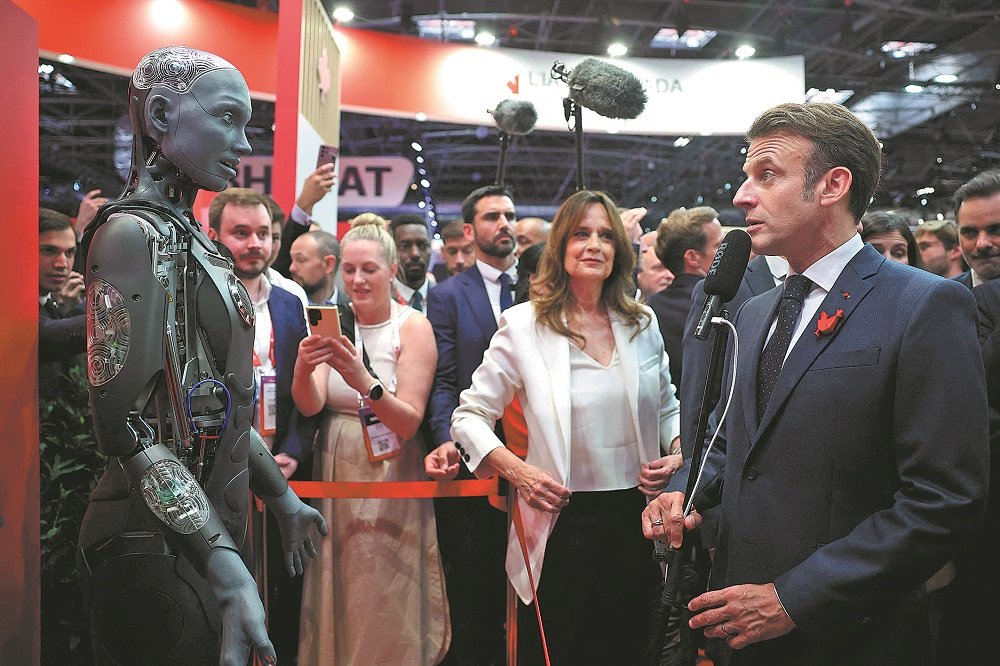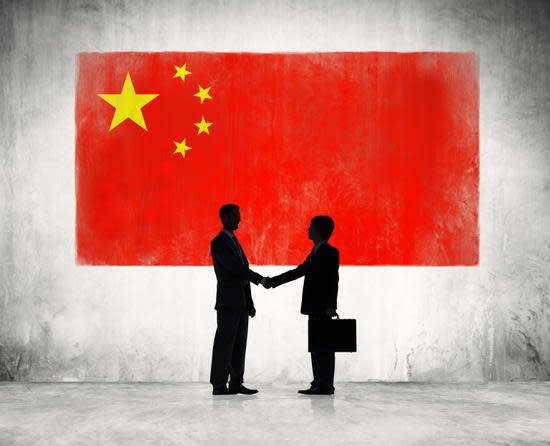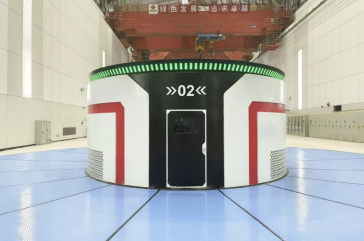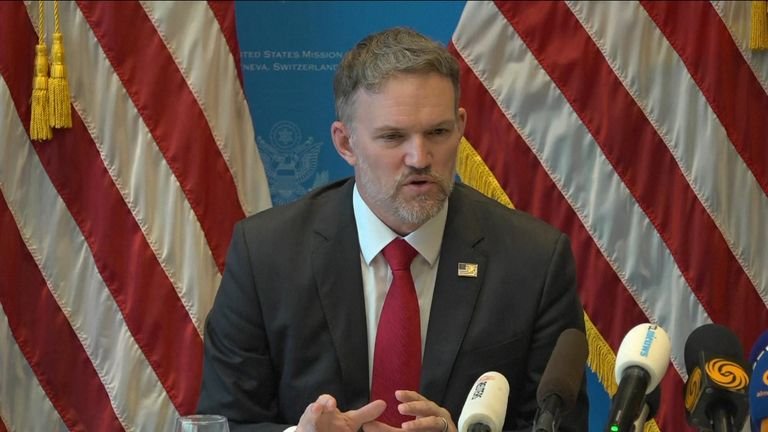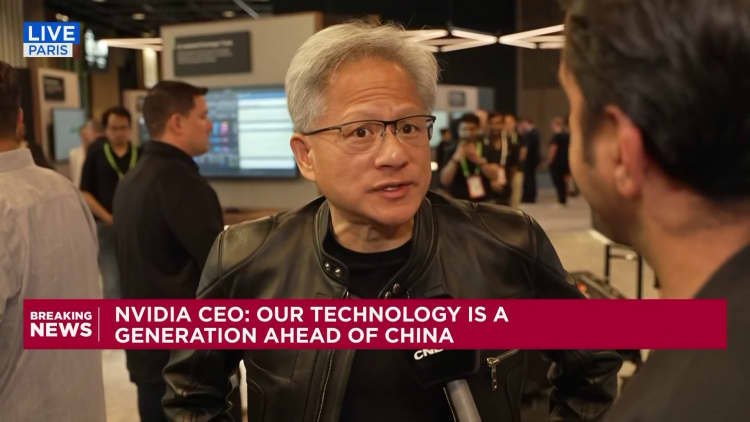Crews walk towards a Royal Navy F-35B Lightning fighter jet to prepare it for take-off from the deck of British aircraft carrier HMS Prince Of Wales, in an undisclosed location, on April 24, 2025, following its deployment to the Indo-Pacific region.
Richard Pohle | Afp | Getty Images
The automotive and robotics industries have been hit particularly hard by China’s rare earth export restrictions in recent weeks, but analysts warn Western defense giants will also feel the heat.
Top U.S. and Chinese officials are resuming trade talks in London for a second consecutive day on Tuesday, pushing to de-escalate tensions over rare-earth minerals and advanced technology.
The White House has signaled a willingness to ease chip export controls if Beijing accelerates rare earth exports, boosting investor hopes of a breakthrough. Both sides have accused each other of reneging on a preliminary trade deal struck in Geneva last month.
China’s Ministry of Commerce in early April imposed export restrictions on several rare earth elements and magnets widely used in the automotive and defense sectors. The curbs were part of a response to U.S. President Donald Trump‘s tariff increase on Beijing’s exported products.
National Economic Council Director Kevin Hassett on Monday told CNBC’s “Squawk Box” that he expected a deal on rare earths to be struck quickly.
“So, our expectation is that … immediately after the handshake any export controls from the U.S. will be eased, and the rare earths will be released in volume, and then we can go back to negotiating smaller matters,” Hassett said.
China is the undisputed leader of the critical minerals supply chain, producing roughly 60% of the world’s supply of rare earths and processing almost 90%, which means it is importing these materials from other countries and processing them.
U.S. officials have previously warned that this dominance poses a strategic challenge amid the pivot to more sustainable energy sources.
William Bain, head of trade policy at the British Chambers of Commerce, said it appeared some progress had been made on the first day of U.S.-China trade talks, but it remains “absolutely vital” to achieve a further breakthrough on rare earth policy.
“We’ve seen some relaxation over the weekend with licenses granted in sectors connected with robotics and electric vehicles, but if you take, for example, a critical mineral like samarium, within magnets, that’s absolutely essential for F-35 fighter jet construction in the U.S,” Bain told CNBC’s “Europe Early Edition” on Tuesday.
“They can’t make them without that. And not having access to that is severely affecting both U.S. construction in that area, but also perhaps its national security if that remains in place,” he added.
Workers transporting soil containing rare earth elements for export at a port in Lianyungang, Jiangsu province, China, Oct. 31, 2010.
Stringer | Reuters
Shares of some European defense giants were trading lower on Tuesday morning ahead of the fresh U.S.-China negotiations. German tank gearbox manufacturer Renk tumbled nearly 8% to lead losses on the pan-European Stoxx 600 index. Sweden’s Saab and Germany’s Rheinmetall, meanwhile, both fell more than 3.5%.
CNBC has contacted the U.S. Department of Defense and the European Commission, the European Union’s executive arm, for comment.
‘Front line of impact’
The restrictions imposed by China’s Ministry of Commerce in early April require firms to apply for a license for the export of rare earths and magnets.
Rare earth elements play an integral role in modern defense technologies, according to the SFA-Oxford consultancy, enabling advanced radar and sonar systems, laser guidance and propulsion technologies in combat environments.
Automotive industry groups have complained about the cumbersome process of trying to get necessary approvals, warning of increasing production threats as inventories deplete. China nevertheless appeared to offer U.S. and European auto giants something of a reprieve over the weekend.
China’s Ministry of Commerce on Saturday said it was willing to establish a so-called “green channel” for eligible export license applications to expedite the approval process to European Union firms. Beijing also granted rare earth licenses to suppliers of U.S. auto giants General Motors, Ford and Jeep-maker Stellantis, Reuters reported on Friday, citing unnamed sources.

Gracelin Baskaran, director of the critical minerals security program at the Center for Strategic and International Studies (CSIS), a Washington-based think tank, said it was just a matter of time before the defense industry sounds the alarm over a rare earth shortage — noting that many of them have already done so behind closed doors.
“Defense companies are in the front line of impact, given we need thousands of pounds of rare earths in each submarine and fighter jet,” Baskaran told CNBC by email.
The U.S., European Union and Australia must coordinate supply- and demand-side interventions to boost rare earths production, CSIS’ Baskaran said, adding that this need arises primarily because of prevailing price dynamics.
“If the price of praseodymium-neodymium (PrNd) oxide—a critical input for rare earth permanent magnets—remains below $60 per kilogram by 2030, nearly half of the projected non-Chinese supply would become financially unviable. On the supply side, this will necessitate measures such as production tax credits and subsidies,” Baskaran said.
“On the demand side, implementing incentives to procure minerals from allied nations—similar to the provisions in the Inflation Reduction Act—will be essential,” she added.
Magnet production
Last month, China temporarily paused export restrictions targeting 28 American companies following a trade truce reached between Washington and Beijing in Switzerland.
China continued to block exports from that country of seven rare earth metals to the U.S., however. Many of the 28 American companies given a reprieve on dual-use export restrictions are common targets of Beijing’s sanctions because of their activity in the defense sector.
Henry Sanderson, associate fellow at the Royal United Services Institute (RUSI), a London-based defense and security think tank, said the defense industry hasn’t been nearly as vocal as the automotive sector when it comes to concerns over the impact of a rare earth shortage.
“Defense is hard because its less transparent, but they definitely use rare earths and rare earth magnets and especially what’s called samarium cobalt magnets, but it’s a much smaller demand than EVs or robots or anything like that,” Sanderson told CNBC by phone.
“I’m less clear whether defense is as worried as the civilian industries, but saying that, looking at the level of magnet production in the West, it is very small,” he added.
— CNBC’s Eunice Yoon and Erin Doherty contributed to this report.

